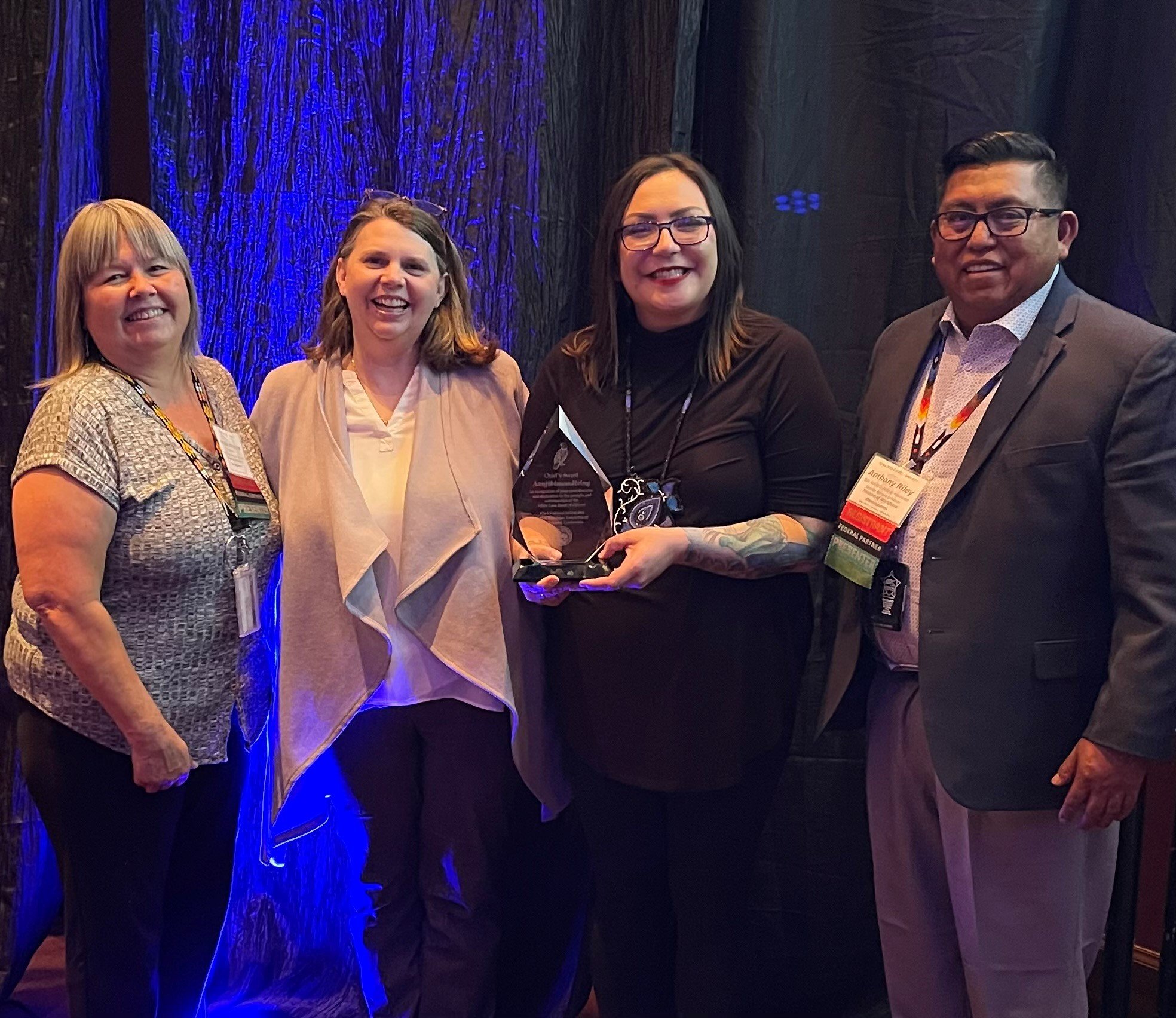Mille Lacs Receives Division Chief’s Award
Aanjibimaadizing Recognized by the Department of Interior
The Aanjibimaadizing program was awarded the Chief’s Award at the 42nd National Indian and Native American Employment and Training Conference (NINAETC). The award was issued by the Department of Interior on May 3, 2022.
NINAETC serves the needs of a broad membership of Indian and Native American tribal governments, consortia, and organizations by providing training for grantees who are funded under either Section 166 of the Workforce Innovation and Opportunity Act or the Public Law 102-477 Act. There are 72 tribal programs that operate as grantees under PL 102-477 nationally. Each year, one PL 102-477 program grantee receives the Division Chief’s Award.
“I would like to express my gratitude to the staff at Aanjibimaadizing for prioritizing the service, success, and overall wellbeing of our Mille Lacs Band community members who participate in the program,” said Mille Lacs Band Chief Executive Melanie Benjamin. “The growth and the support administered is unparalleled across the region and the country. We couldn’t be prouder.”
Aanjibimaadizing was nominated for the award by Rae Belle Whitcomb, Workplace Development Specialist, Bureau of Indian Affairs. The nomination for the award cited Aanji’s excellence in service as demonstrated by its statistical and narrative reports.
To be one out of 72 tribal organizations to receive the award is a testament to the passion, drive, and commitment of the Aanji staff, according to Tammy Wickstrom, Executive Director of Aanjibimaadizing.
“Aanjibimaadizing has come so far in three short years, and I am so proud of this department and of our staff who work tirelessly to provide multiple services to Band members and other tribal members in the state,” Wickstrom said. “This award is a huge win for our staff, and a meaningful validation of our program model.”
The Aanjibimaadizing program has expanded many services in the last few years. By absorbing the Niigaan and Wraparound programs from Education and Health and Human Services respectively; Aanji was able to save Band net revenue by moving the cost from those services under the umbrella of the 477 grant.
Niigaan was combined with Wiidoo to create Ge-Niigaanizijig youth services. Both programs were providing similar services for Band youth. Combining the two entities eliminated duplication of services and the need for competing for youth enrollment in each program. That in turn created a stronger, more enriching program for youth in all districts. Ge-Niigaanizijig activities and regularly scheduled meetings are designed to inspire and motivate youth to embrace a traditions-based pro-social lifestyle free of chemicals, anti-social or risky behavior, promiscuity, and dependency. These activities are offered to all eligible Reservation service area youth from kindergarten through age 20.
The same is true for the absorption of Wraparound. That program is now called Facilitated Services under Aanjibimaadizing and is able to provide a broad variety of services to better serve the needs of Band members. Aanjibimaadizing addresses barriers to employability, education, housing, health, mental health or any other holistic need a client has.
Wickstrom noted the Rosetta Stone project as another success story. While the language-learning program in and of itself is a major win for the Mille Lacs Band and members, the project created employment opportunities and growth and development for many Band members. There were many part-time, temporary, and contract positions that enabled Band members opportunities to earn income and learn new skills. Ojibwe language and cultural skills are an area of emergent employment to maintain the Band’s identity and values, while providing services to Band members. Employment opportunities may include, but not be limited to; curriculum developer, educator, administrator, traditional harvester, writer, and archivist, as well as, participate in cultural activities with a rich understanding and be able to support the transmission of Anishinaabe knowledge.
AANJIBIMAADIZING HIGHLIGHTS INCLUDE:
• Client and youth participation has more than doubled from 307 in FY18 to 736 in FY21 for adults and from 180 in FY18 to 406 in FY21 for youth.
• Staffing was increased to meet the multiple needs of adult and youth clients (73% of Aanjibimaadizing staff are Native Americans and over half are MLBO members or descendants).
• Two counties of service were added.
• SNAP access was addressed.
• Youth Services were expanded to all districts and the Urban Area.
• Absorbed Wraparound and Niigaan to avoid duplication of services and save net revenue.
• The number of training sessions offered have increased over 1,800% — from 13 in FY18 to over 250 per year in FY21.
• Administration was provided for five separate COVID-19 funding streams.
• Improved data collection.
• Launched the aanji.org website.
• Put forms online for better access and transparency.
• Moved to Laserfiche to streamline payment process.
• Completed five monolingual books.
• Launched Rosetta Stone – Ojibwe, and have distributed nearly 2,500 accounts.
• Supported Mille Lacs Band Early Education Program
• Average adult earning gain increased from $6.63 to $12.75.
• Businesses assisted has increased from 1 to 126.
• Distributed over $2.6 million in COVID-19 funding.
• One of the first in the nation to distribute pandemic funds.
• Developed processes pertaining to the pandemic funds that were copied across the state.
• Provided award-winning service to over 800 families.
All Aanjibimaadizing program services are offered to support obtaining and retaining employment, improving or creating a position of job readiness, and addressing barriers through the Mille Lacs Band 477 Program in accordance with Public Law 102-477.

